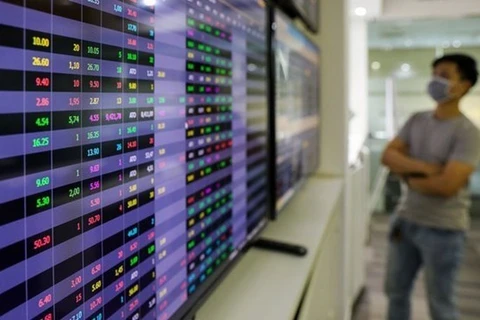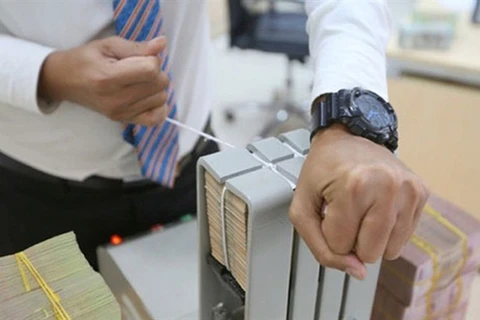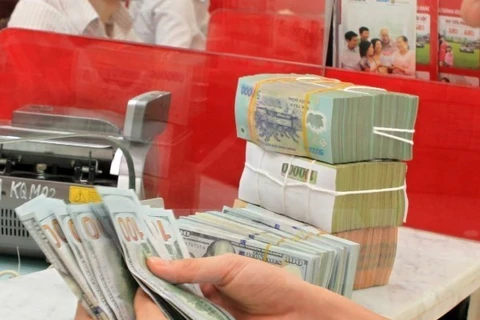Hanoi (VNA) – Despite impacts of the COVID-19 pandemic, credit growth continued to expand in the first nine months of this year thanks to comprehensive and effective solutions, according to Deputy Governor of the State Bank of Vietnam (SBV) Dao Minh Tu.
Speaking at a press briefing on October 12 on the banking sector’s operations in the third quarter of 2021, Tu said that the capital inflow has remained smooth, and operations of banks safe.
Credit growth reaches 7.42 percent
According to Tu, amid the difficult domestic economic situation caused by the pandemic, operations of the banking sector have been safe and smooth, meeting the demands of businesses, people and the economy.
The monetary policy was managed proactively and flexibly in close coordination with the fiscal policy and other macroeconomic policies in order to control the inflation and maintain the macro-economic and market stability, thus ensuring readiness to meet the capital needs for economic recovery.
Thanks to concerted measures, credit growth has improved since the very beginning of this year, he said, noting that as of October 7, annual credit growth of the whole system had reached 7.42 percent, a rate higher than the 5.48 percent of same period last year.
“This is a positive result amid the adverse impacts of COVID-19 and the rising demands of capital,” stated the SBV official.
He underlined that, for the rest of the year, credit growth is expected to reach 4.5 percent. However, the completion of the target of 12 percent growth for the whole year depends on the real situation of the economy. If inflation is kept stable, the SBV may loosen the credit ceiling for banks to create favourable conditions for them to support businesses, he said.
Tu said that the banking sector had also actively conducted several support programmes to help the people and businesses victimised by the pandemic to overcome the difficulties. As for the programme of providing loans to employers for paying work suspension benefits and wages/salaries to recover their production and business operations in line with Resolution No.68/NQ-CP and Decision No.23/2021/QD-TTg), the SBV had disbursed 462 billion VND from the refinancing fund to Vietnam Bank for Social Policies (VBSP). They had extended debts for 918 employers with a total outstanding loan of VND 461 billion to pay benefits and wages/salaries for 130,741 employees.
Regarding the results of removing difficulties for rice purchasing and consumption, after more than one month since the issuance of the SBV’s direction in Document No. 5747/NHNN-TD, outstanding loans for rice purchasing and consumption in the Mekong Delta had increased by nearly 5,000 billion VND. The targets of credit extension had increased by 1.5 trillion VND, he added.
Over 11.8 trillion VND of interest exempted
According to the reports by the credit institutions, by end of September 2021 the credit institutions had provided new loans with lower interest rates compared to pre-COVID time. The accumulated amount since January 23 last year is 5,200 trillion VND for 800,000 customers.
They had exempted and reduced interest rates for over 1.7 million customers, with outstanding loans topping 2,500 trillion VND. According to the accumulated estimates from January 23, 2020 to the end of September 2021, the total amount of interest which has been exempted or reduced by the credit institutions for their customers was 27 trillion VND. Of this, the accumulated total amount of profit cuts as committed by 16 commercial banks (accounting for 75 percent of the total loan outstanding of the economy) from July 15, 2021 to end of September 2021 was 11.813 trillion VND, fulfilling 57.31 percent of their pledges.
Pham Thanh Ha, head of the SBV’s Monetary Policy Department, said that in 2020, the SBV made three reductions to the managing interest rate and gave the green light to the market to make continuous declines that year as well as in 2021.
Since the beginning of this year, loan interest rates have been reduced by about 0.7 percent. Deposit interest rates were also down by 0.4 percent.
By end of September 2021, credit institutions had restructured debt repayment terms for 278,000 borrowers, with the total outstanding loan of 238 trillion VND. The accumulated debts of these payments had been rescheduled. Debt classifications maintained since January 23, 2020 were about 531 trillion VND.
Deputy Governor Dao Minh Tu said that, in the time to come, based on the objectives of the National Assembly and the Government in the socio-economic development plan for 2021, the SBV will continue to operate the monetary policy proactively and flexibly in close coordination with the fiscal policy and other macroeconomic policies. This will be done in order to control inflation, maintain macroeconomic and market stability, while continuing to implement the policies and the solutions that are currently on-going to address the difficulties caused by COVID-19. It will ensure readiness to meet the capital needs for economic recovery./.
























